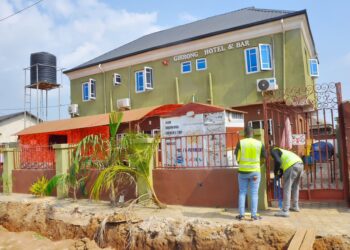The Lagos State Government has announced its plan to meet the state’s daily water supply need of 240 million gallons, with the United States Agency for International Development (USAID) refurbishing five mini and micro waterworks as part of this effort.
This was revealed by the Commissioner for Environment and Water Resources, Tokunbo Wahab, during a recent Executive Couch interview with Nairametrics, where he emphasized the state’s commitment to solving its persistent water crisis.
He also noted that other partners have joined the initiative to refurbish additional waterworks across the state.
“The total need of Lagos is about 240–250 million gallons per day. But what we have done differently is that we have now looked inwards.
“The government has signed the Lagos Urban Water Sanitation and Hygiene (LUWASH) policy, and that has opened the door for investors to come into that ecosystem.
“USAID has taken up five of the mini and micro waterworks, refurbishing them to take water out of them,” Wahab said.
The Commissioner stressed that USAID’s refurbishment of five mini and micro waterworks, along with other partners handling additional sites, is crucial in meeting the immediate water demand.
He noted that these upgrades will improve access to underserved areas and, once completed, will strengthen the existing infrastructure as a temporary solution until larger projects, like Adiyan 2 waterworks, can meet the full demand.
Lagos State Government’s broader water supply efforts
Wahab explained that the Lagos State Government is addressing the state’s water challenges through large-scale projects like the Adiyan 2 and Iju waterworks.
While the formwork for Adiyan 2 is complete, the next phase—reticulation and piping—will take place over the next 24 months to ensure water distribution reaches all areas of Lagos.
Adiyan 2 is expected to provide up to 40 million gallons of water per day, helping to close the gap between the current supply and the 240 million gallons needed daily.
He highlighted that the Iju waterworks is also essential to the state’s water strategy, with ongoing efforts to resolve power supply issues and secure the necessary right of way from Ogun State.
Wahab stressed that investments in these projects are carefully planned to ensure proper use of taxpayer funds.
Although the Lagos Water Corporation has received funds for chemicals and running costs, Wahab noted these have been insufficient for the broader infrastructural needs.
He noted that the government is now providing more financial support and working with investors who have agreed to share the burden of expanding and refurbishing the waterworks.
Wahab assured residents that, with careful planning and partnerships, the state is on track to improve water access. However, he emphasized the service will not be free, though it may be subsidized.















.gif)






